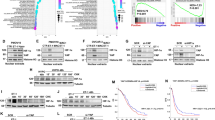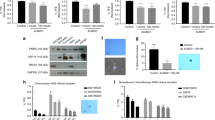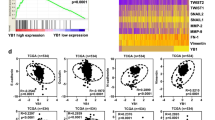Abstract
Anti-vascular endothelial growth factor (VEGF) therapy has demonstrated efficacy in treating human metastatic cancers, but therapeutic resistance is a practical limitation and most tumors eventually become unresponsive. To identify microenvironmental factors underlying the resistance of cancer to antiangiogenesis therapy, we conducted genomic analyses of intraperitoneal ovarian tumors in which adaptive resistance to anti-VEGF therapy (B20 antibody) developed. We found that expression of the microseminoprotein, prostate-associated (MSMP) gene was substantially upregulated in resistant compared with control tumors. MSMP secretion from cancer cells was induced by hypoxia, triggering MAPK signaling in endothelial cells to promote tube formation in vitro. Recruitment of the transcriptional repressor CCCTC-binding factor (CTCF) to the MSMP enhancer region was decreased by histone acetylation under hypoxic conditions in cancer cells. MSMP siRNA, delivered in vivo using the DOPC nanoliposomes, restored tumor sensitivity to anti-VEGF therapy. In ovarian cancer patients treated with bevacizumab, serum MSMP concentration increased significantly only in non-responders. These findings imply that MSMP inhibition combined with the use of antiangiogenesis drugs may be a new strategy to overcome resistance to antiangiogenesis therapy.
This is a preview of subscription content, access via your institution
Access options
Subscribe to this journal
Receive 50 print issues and online access
$259.00 per year
only $5.18 per issue
Buy this article
- Purchase on Springer Link
- Instant access to full article PDF
Prices may be subject to local taxes which are calculated during checkout






Similar content being viewed by others
References
Hillen F, Griffioen AW . Tumour vascularization: sprouting angiogenesis and beyond. Cancer Metastasis Rev 2007; 26: 489–502.
Kim KJ, Li B, Winer J, Armanini M, Gillett N, Phillips HS et al. Inhibition of vascular endothelial growth factor-induced angiogenesis suppresses tumor-growth invivo. Nature 1993; 362: 841–844.
Burger RA, Brady MF, Bookman MA, Fleming GF, Monk BJ, Huang H et al. Incorporation of bevacizumab in the primary treatment of ovarian cancer. N Engl J Med 2011; 365: 2473–2483.
Perren TJ, Swart AM, Pfisterer J, Ledermann JA, Pujade-Lauraine E, Kristensen G et al. A phase 3 trial of bevacizumab in ovarian cancer. N Engl J Med 2011; 365: 2484–2496.
Pujade-Lauraine E, Hilpert F, Weber B, Reuss A, Poveda A, Kristensen G et al. Bevacizumab combined with chemotherapy for platinum-resistant recurrent ovarian cancer: The AURELIA open-label randomized phase III trial. J Clin Oncol 2014; 32: 1302–1308.
Hurwitz H, Fehrenbacher L, Novotny W, Cartwright T, Hainsworth J, Heim W et al. Bevacizumab plus irinotecan, fluorouracil, and leucovorin for metastatic colorectal cancer. N Engl J Med 2004; 350: 2335–2342.
Sandler A, Gray R, Perry MC, Brahmer J, Schiller JH, Dowlati A et al. Paclitaxel-carboplatin alone or with bevacizumab for non-small-cell lung cancer. N Engl J Med 2006; 355: 2542–2550.
Rini BI, Halabi S, Rosenberg JE, Stadler WM, Vaena DA, Ou SS et al. Bevacizumab plus interferon alfa compared with interferon alfa monotherapy in patients with metastatic renal cell carcinoma: CALGB 90206. J Clin Oncol 2008; 26: 5422–5428.
Friedman HS, Prados MD, Wen PY, Mikkelsen T, Schiff D, Abrey LE et al. Bevacizumab alone and in combination with irinotecan in recurrent glioblastoma. J Clin Oncol 2009; 27: 4733–4740.
Uhlen M, Oksvold P, Fagerberg L, Lundberg E, Jonasson K, Forsberg M et al. Towards a knowledge-based Human Protein Atlas. Nat Biotechnol 2010; 28: 1248–1250.
Pei X, Sun Q, Zhang Y, Wang P, Peng X, Guo C et al. PC3-secreted microprotein is a novel chemoattractant protein and functions as a high-affinity ligand for CC chemokine receptor 2. J Immunol 2014; 192: 1878–1886.
Valtonen-Andre C, Bjartell A, Hellsten R, Lilja H, Harkonen P, Lundwall A . A highly conserved protein secreted by the prostate cancer cell line PC-3 is expressed in benign and malignant prostate tissue. Biol Chem 2007; 388: 289–295.
Rosenbloom KR, Armstrong J, Barber GP, Casper J, Clawson H, Diekhans M et al. The UCSC Genome Browser database: 2015 update. Nucleic Acids Res 2015; 43: D670–D681.
Rosenbloom KR, Sloan CA, Malladi VS, Dreszer TR, Learned K, Kirkup VM et al. ENCODE data in the UCSC Genome Browser: year 5 update. Nucleic Acids Res 2013; 41: D56–D63.
Ghirlando R, Felsenfeld G . CTCF: making the right connections. Genes Dev 2016; 30: 881–891.
Kim MS, Kwon HJ, Lee YM, Baek JH, Jang JE, Lee SW et al. Histone deacetylases induce angiogenesis by negative regulation of tumor suppressor genes. Nat Med 2001; 7: 437–443.
Drappatz J, Lee EQ, Hammond S, Grimm SA, Norden AD, Beroukhim R et al. Phase I study of panobinostat in combination with bevacizumab for recurrent high-grade glioma. J Neurooncol 2012; 107: 133–138.
Lee EQ, Reardon DA, Schiff D, Drappatz J, Muzikansky A, Grimm SA et al. Phase II study of panobinostat in combination with bevacizumab for recurrent glioblastoma and anaplastic glioma. Neuro Oncol 2015; 17: 862–867.
Strickler JH, Starodub AN, Jia J, Meadows KL, Nixon AB, Dellinger A et al. Phase I study of bevacizumab, everolimus, and panobinostat (LBH-589) in advanced solid tumors. Cancer Chemother Pharmacol 2012; 70: 251–258.
Weth O, Paprotka C, Gunther K, Schulte A, Baierl M, Leers J et al. CTCF induces histone variant incorporation, erases the H3K27me3 histone mark and opens chromatin. Nucleic Acids Res 2014; 42: 11941–11951.
Bast RC Jr., Feeney M, Lazarus H, Nadler LM, Colvin RB, Knapp RC . Reactivity of a monoclonal antibody with human ovarian carcinoma. J Clin Invest 1981; 68: 1331–1337.
Buick RN, Pullano R, Trent JM . Comparative properties of five human ovarian adenocarcinoma cell lines. Cancer Res 1985; 45: 3668–3676.
Landen CN, Kim TJ, Lin YG, Merritt W, Kamat AA, Han L et al. Tumor-selective response to antibody-mediated targeting of alpha(v)beta(3) integrin in ovarian cancer. Neoplasia 2008; 10: 1259–1267.
Lau DH, Lewis AD, Ehsan MN, Sikic BI . Multifactorial mechanisms associated with broad cross-resistance of ovarian carcinoma cells selected by cyanomorpholino doxorubicin. Cancer Res 1991; 51: 5181–5187.
Yoneda J, Kuniyasu H, Crispens MA, Price JE, Bucana CD, Fidler IJ . Expression of angiogenesis-related genes and progression of human ovarian carcinomas in nude mice. J Natl Cancer Inst 1998; 90: 447–454.
Acknowledgements
SP is supported by a Foundation for Women’s Cancer grant and Ovarian Cancer Research Fund Alliance. SW is supported by Ovarian Cancer Research Fund Alliance, Foundation for Women’s Cancer, Texas Center for Cancer Nanomedicine, and Cancer Prevention and Research Institute of Texas training grants (RP101502 and RP101489, respectively). KN is supported by the Ovarian Cancer Research Fund Alliance (grant 292015) and KRIBB Research Initiative Program. TH is supported by Uehara Memorial Foundation Research Fellowships for Research Abroad. Portions of this work were supported by the National Institutes of Health grants (CA016672, CA109298, P50 CA083639, P50 CA098258 and UH3 TR000943), Ovarian Cancer Research Fund, Inc. (Program Project Development Grant), American Cancer Society Research Professor Award, Blanton-Davis Ovarian Cancer Research Program, RGK Foundation and the Frank McGraw Memorial Chair in Cancer Research.
Author information
Authors and Affiliations
Corresponding author
Ethics declarations
Competing interests
The authors declare no conflict of interest.
Additional information
Supplementary Information accompanies this paper on the Oncogene website
Supplementary information
Rights and permissions
About this article
Cite this article
Mitamura, T., Pradeep, S., McGuire, M. et al. Induction of anti-VEGF therapy resistance by upregulated expression of microseminoprotein (MSMP). Oncogene 37, 722–731 (2018). https://doi.org/10.1038/onc.2017.348
Received:
Revised:
Accepted:
Published:
Issue Date:
DOI: https://doi.org/10.1038/onc.2017.348
This article is cited by
-
Nanoparticle-mediated cancer cell therapy: basic science to clinical applications
Cancer and Metastasis Reviews (2023)
-
Targeting CCR2+ macrophages with BET inhibitor overcomes adaptive resistance to anti-VEGF therapy in ovarian cancer
Journal of Cancer Research and Clinical Oncology (2022)
-
Elastic Correlation Adjusted Regression (ECAR) scores for high dimensional variable importance measuring
Scientific Reports (2021)
-
Drug resistance in cancer: mechanisms and tackling strategies
Pharmacological Reports (2020)



